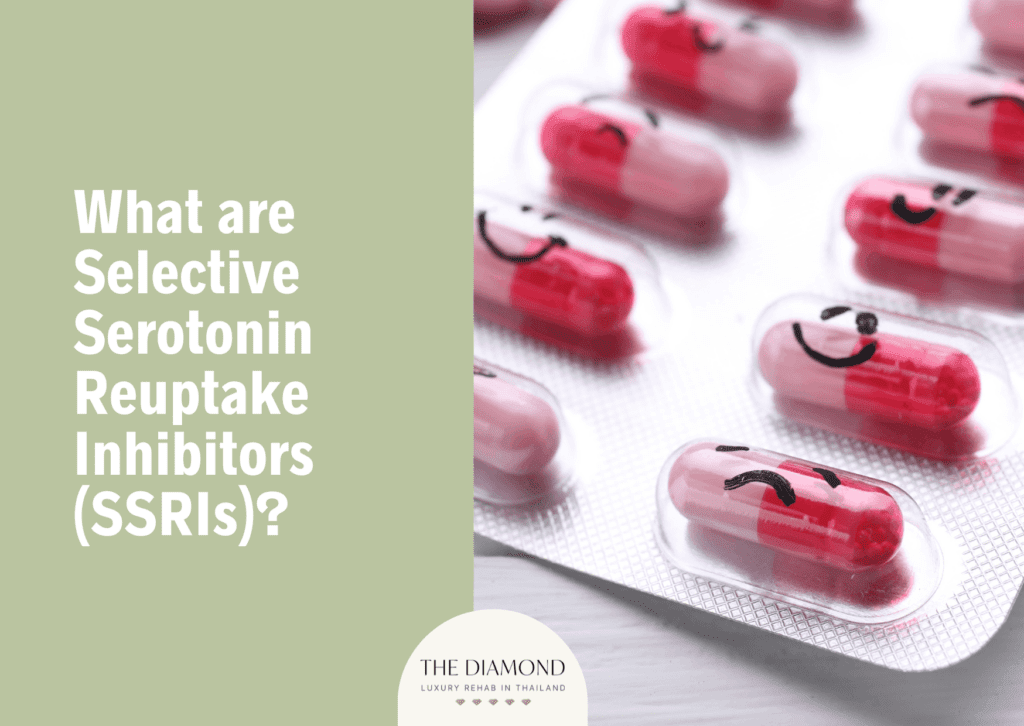What are Selective Serotonin Reuptake Inhibitors (SSRIs)
Table of content
- What are Selective Serotonin Reuptake Inhibitors?
- How do Selective Serotonin Reuptake Inhibitors work?
- Where are Selective Serotonin Reuptake Inhibitors being used?
- What are the possible side effects of Selective Serotonin Reuptake Inhibitors?
- What are the different types of Selective Serotonin Reuptake Inhibitors?
- What are the things to consider before taking SSRIs?
- Are Serotonin Reuptake Inhibitors Safe to use?

Selective serotonin reuptake inhibitors (SSRIs) are the most widely prescribed class of antidepressants. They are most frequently used to treat depression, but can also be used in the treatment of several other mental health conditions.
SSRIs are useful in relieving symptoms and preventing them from coming back so that people with mental health concerns can feel emotionally stable again.
An SSRI medication works by increasing levels of a brain chemical called serotonin, which acts as a mood stabilizer. Since it controls your mood and is responsible for your happiness, it comes with little surprise that serotonin is also sometimes known as the happy chemical.
What are Selective Serotonin Reuptake Inhibitors?
Selective serotonin reuptake inhibitors are a group of antidepressant medicines prescribed for the treatment of depression and other mental health conditions, such as generalized anxiety disorder (GAD), bulimia nervosa, obsessive-compulsive disorder (OCD), and panic disorder, to name a few.
SSRI drugs are considered the first-line choice for the treatment of depression and anxiety disorders because they are best known for their role in regulating mood.That being said, they are well-tolerated by most people. However, this class of antidepressants does not always work as intended for everyone, hence why there are certain guidelines on using selective serotonin reuptake inhibitors.
SSRIs are not typically recommended for pregnant or breastfeeding women, and those under 18 years of age. While taking specific antidepressants may harm the baby during pregnancy or while breastfeeding, others may also increase the risk of suicidal thoughts and actions for young people under the age of 18.
How do Selective Serotonin Reuptake Inhibitors work?
Selective serotonin reuptake inhibitors work by inhibiting or stopping the reuptake or reabsorbing of serotonin, which leaves more of the substance available for the body to use. This increase in serotonin levels is believed to regulate mood, body temperature, sleep, digestion, and other various bodily functions.
Aside from alleviating depression, SSRIs may also assist the brain in using serotonin more efficiently.
Where are Selective Serotonin Reuptake Inhibitors being used?
Although SSRI medications are most commonly prescribed to treat clinical depression, they are also useful in numerous other mental health disorders. Selective serotonin reuptake inhibitors are also being used for the following psychological issues:
1. Generalised anxiety disorder (GAD)
Generalised anxiety disorder (GAD) is a mental health condition that causes excessive fear, worry, and tension over a wide range of everyday life situations. These negative emotions are constantly triggered for no apparent reason. SSRIs are particularly ideal for the long-term treatment of GAD, as they begin reducing anxiety symptoms within two to six weeks of use. The use of SSRIs does not only increase levels of serotonin in the brain, but it also causes structural changes in neurons, which causes increased flexibility or neuroplasticity. This makes the brain more amenable to changes necessary in decreasing anxiety levels. The SSRI list of meds that can be used for GAD include fluoxetine (Prozac), sertraline (Zoloft), and escitalopram (Lexapro).
2. Obsessive-compulsive disorder (OCD)
Obsessive-compulsive disorder (OCD) is a mental condition that is characterized by obsessive thoughts and repetitive behaviors that a person with the disorder feels compelled to do over and over again to make the unwanted thoughts go away. OCD causes significant distress or anxiety to someone’s life. Research has shown that SSRIs are one of the most effective treatments for OCD because they help brain cells communicate better with one another and also carry fewer side effects compared to older antidepressants.
3. Panic disorder
Panic disorder is a type of anxiety disorder that causes recurrent and disabling panic attacks at unpredictable times without a particular trigger or cause. SSRI meds are often recommended as the first choice of medications to treat symptoms associated with panic attacks. Some SSRI antidepressants that are FDA-approved for the treatment of panic disorder include paroxetine (Paxil, Pexeva), fluoxetine (Prozac), and sertraline (Zoloft).
4. Severe phobias, such as agoraphobia and social phobia
Complex phobias refer to deep-rooted fears which tend to have more disruptive or overwhelming effects on people’s lives. They are often associated with intense fear and/or anxiety around a particular situation or circumstance. The two most common examples of severe phobias are agoraphobia and social phobia. Agoraphobia refers to a fear and avoidance of places or situations from which it may be difficult to escape or receive help. On the other hand, social phobia involves an intense fear or anxiety of being judged or humiliated in social situations. Some FDA-approved SSRI antidepressants that help reduce anxiety and panic disorder symptoms associated with both agoraphobia and social phobia are sertraline (Zoloft) and paroxetine (Paxil).
5. Bulimia
Bulimia nervosa, commonly called bulimia, refers to an eating disorder that is characterized by a cycle of binging and purging, where people eat large quantities of food and then later on engage in unhealthy behaviors to try to compensate for overeating by vomiting, fasting, or taking laxatives. Some people who struggle with binging and purging also have depression, making antidepressant medications like SSRIs helpful for them. Experts also suspect that an imbalance of serotonin levels contributes to bulimia behaviors. SSRIs that are prescribed for the treatment of bulimia include fluoxetine (Prozac), citalopram (Celexa), paroxetine (Paxil), and sertraline (Zoloft).
6. Post-traumatic stress disorder (PTSD)
Post-traumatic stress disorder (PTSD) is a psychological disorder that some people may develop after experiencing or witnessing a traumatic event. Examples of terrifying events that may lead to PTSD are natural disasters, sexual violence, serious accident, war, or sudden death of a loved one. Medications that are highly effective in treating depression, such as selective serotonin reuptake inhibitors, can also help reduce PTSD symptoms. The only SSRI medicines approved by the FDA for PTSD are sertraline (Zoloft) and paroxetine (Paxil).
What are the possible side effects of Selective Serotonin Reuptake Inhibitors?
SSRIs are generally well-tolerated by most people. But the truth is that all medications carry some kind of risk with them. That said, some people may react differently to this class of antidepressants. The possible side effects of selective serotonin reuptake inhibitors are listed below.
- Headache: A meta-analysis published in the Journal of Affective Disorders found that second-generation antidepressants, such as SSRIs and SNRIs, are associated with a significantly higher risk of headaches. Reports suggest that headaches are often experienced after starting antidepressant therapy.
- Dry mouth: is a common side effect of taking SSRIs. This is because these medications tend to cause salivary gland hypofunction, which is typically accompanied by a feeling of a dry mouth, and is more commonly seen in older patients than in younger adults.
- Drowsiness: Aside from acting on serotonin, antidepressants also affect other neurotransmitters, such as histamine and acetylcholine, which may lead you to feel as if you’re tired and sleepy.
- Agitation or anxiety: Early worsening of anxiety and agitation is reported to be common among patients during the first days of antidepressant treatment. The reason behind this are the low serotonin levels that cause anxiety in the first place. When people begin taking SSRIs for their conditions, their serotonin levels start to fluctuate during the early days of treatment, hence the heightened anxiety symptoms.
- Insomnia: Complaints of insomnia, which make it harder for people to stay or fall asleep, is commonly reported in patients treated with SSRIs. It is believed that this class of antidepressants have an effect on the serotonergic system, which is responsible for many physiological processes, including sleep.
- Reduced interest in sex: Low sexual desire commonly affects patients taking SSRI medicines. They can make it difficult for men to get an erection or ejaculate, and can also prevent women from having an orgasm.
- Gastrointestinal issues: Some gastrointestinal (GI) side effects observed in patients while taking SSRIs include nausea, vomiting, diarrhea, and constipation. Although these issues resolve without treatment, they may contribute to early discontinuation of the pills.
What are the different types of Selective Serotonin Reuptake Inhibitors?

The different types of selective serotonin reuptake inhibitors are listed below.
1. Citalopram (Cipramil)
Citalopram is available both in the US and the UK as Celexa and Cipramil, respectively. If prescribed by your doctor, taking this medicine is important in improving your mood so that you feel better, sleep better, and feel less anxious. Citalopram is used to treat depression and panic attacks. It can also be used as an add-on therapy for the treatment of obsessive-compulsive disorder (OCD), alcoholism, bipolar disorder, eating disorders, and premenstrual dysphoric disorder, to name a few. Citalopram has a different chemical structure compared to other available serotonin pills, and has also been found by several studies to have superior efficacy in the treatment of major depressive disorder (MDD).
2. Dapoxetine (Priligy)
Dapoxetine is primarily marketed as Priligy and is approved in more than 50 countries worldwide, including the UK. It is also currently being considered for approval by the U.S. FDA. Men who are diagnosed with premature ejaculation (PE) benefit from taking Dapoxetine one to three hours before sexual activity. Although it was initially designed as an antidepressant, it was later on found to be more effective in treating premature ejaculation in men aged 18-64 years old. This is because unlike other selective serotonin reuptake inhibitors, it is rapidly absorbed by the body following oral administration, making it suitable for the treatment of PE.
3. Escitalopram (Cipralex)
Escitalopram is sold under the brand name Cipralex in the UK, while its US brand name is Lexapro. It is essential in improving energy levels, decreasing nervousness, and boosting feelings of wellbeing. Escitalopram is a medicine used to treat depression as well as generalized anxiety disorder (GAD) in adults and children 12 years of age and older. When prescribed off-label, escitalopram may also benefit people who suffer from bulimia nervosa, post-traumatic stress disorder (PTSD), and premenstrual dysphoric disorder (PMDD). A comparative review published in the International Clinical Psychopharmacology suggests that Escitalopram is better tolerated compared to other SSRIs, such as Zoloft or Paxil.
4. Fluoxetine (Prozac or Oxactin)
Fluoxetine is known by the trade names Prozac, Prozep, Olena, and Oxactin. This selective serotonin reuptake inhibitor helps improve your mood, energy level, sleep, and appetite. Fluoxetine is FDA-approved for the treatment of depression, obsessive-compulsive disorder (OCD), panic disorder, bulimia, and premenstrual dysphoric disorder (PMDD). Compared to other SSRIs, people taking Fluoxetine may be more likely to experience headaches, lack of energy, and nervousness.
5. Fluvoxamine (Faverin)
Fluvoxamine is available in the US under the brand names Luvox or Luvox CR, while it is known by the trade name Faverin in the UK. It helps decrease unwanted thoughts and helps reduce the urge to perform repetitive actions, which both end up interfering with daily living. Fluvoxamine is approved by the FDA to treat obsessive-compulsive disorder (OCD) and social phobia (also known as social anxiety disorder). It may also be used off-label for other conditions, including major depressive disorder (MDD), posttraumatic stress disorder (PTSD), panic disorder, and eating disorders as stated by the National Alliance on Mental Illness (NAMI). Compared to other SSRIs, fluvoxamine may have fewer effects on sleep patterns and sexual dysfunction.
6. Paroxetine (Seroxat)
Paroxetine is sold under the trade names Paxil, Paxil CR, and Seroxat among others. This medication has a number of advantages, including the ability to improve your mood, energy level, quality of sleep, and appetite, which can overall increase quality of life. Paroxetine is often used to treat depression and other mental illnesses, such as anxiety disorders, panic attacks, obsessive-compulsive disorder (OCD), or post-traumatic stress disorder (PTSD). Of all SSRIs, paroxetine is known to have the strongest effect on preventing serotonin reuptake. In fact, even at a lower dose, it is still considered as the most potent SSRI available.
7. Sertraline (Lustral)
Sertraline is sold under the brand name Zoloft in the US, and is also known by the trade name Lustral in the UK. Antidepressants like sertraline help you improve your mood, sleep better, and feel more relaxed. This medication can be used to treat major depressive disorder (MDD), social anxiety disorder, post-traumatic stress disorder (PTSD), premenstrual dysphoric disorder (PMDD), and panic disorder. Sertraline is also known to have fewer unwanted side effects compared to older antidepressants.
8. Vortioxetine (Brintellix)
Vortioxetine is a selective serotonin reuptake inhibitor that is primarily sold under the trade names Brintellix and Trintellix. Taking this medication can cause significant improvements in mood, sleep efficiency, and even overall cognitive performance. Vortioxetine is approved for the treatment of a serious form of depression known as major depressive disorder (MDD). It is also pharmacologically different from other antidepressants currently available on the market because aside from inhibiting serotonin reuptake, it also acts on various serotonin receptors, making it more than just an SSRI.
What are the things to consider before taking SSRIs?
SSRI’s are generally well-tolerated by most people. However, there are still a couple of things you need to bear in mind when starting antidepressant therapy. Things to consider before taking SSRIs are listed below.
- Underlying health problems: It is important that your doctor knows about your other underlying medical conditions if you’re planning to use SSRIs. These antidepressants may need to be used with caution if you have conditions such as diabetes, epilepsy, and kidney disease because they may react unpredictably with other medications you may be taking for these health issues.
- Pregnancy: SSRIs aren’t usually recommended during the first three months of pregnancy because of the risks it can pose to the baby, including birth defects affecting its lung or heart, a serious breathing condition called persistent pulmonary hypertension of the newborn (PPHN), and even loss of the pregnancy itself.
- Children and teens: Antidepressant use in children and teens needs careful monitoring because there is concern that it could increase the risk of suicidal thinking and behavior among the population.
- Breastfeeding: All SSRIs pass through breast milk to some degree. However, sertraline and paroxetine are known to have the lowest passage among other SSRI drugs into breast milk. Other antidepressant medications may also be used if your doctor believes that the benefits of SSRI treatment and benefits of breastfeeding appear to outweigh possible risks.
- Drug interactions: Some SSRIs can cause dangerous reactions when taken with other over-the-counter medications, herbal remedies, or other supplements you may be taking, as stated by Mayo Clinic. Some medicines that can interact with certain SSRIs include non-steroidal anti-inflammatory drugs (NSAIDs) like ibuprofen or naproxen, medicines for schizophrenia and psychosis such as clozapine and pimozide, and other antidepressants. Make sure to discuss with your doctor if you’re taking any medicines that may interact with SSRIs.
Are Serotonin Reuptake Inhibitors Safe to use?
Yes, serotonin reuptake inhibitors are generally considered safe to use in most people. However, they can cause some issues in certain cases. For instance, they can raise the risk of bleeding, especially when taken with NSAIDs. Taking high doses of a serotonin reuptake inhibitor called citalopram may also cause an increased risk of heart rhythm problems.
Furthermore, even if they are well-tolerated by many people, the U.S. Food and Drug Administration requires all antidepressants to carry black box warnings, which are meant to draw attention to these medications’ serious side effects related to suicidal thoughts or behavior.
If you’re in doubt, your healthcare provider should be able to help you with any questions you may have regarding the use of SSRIs.

